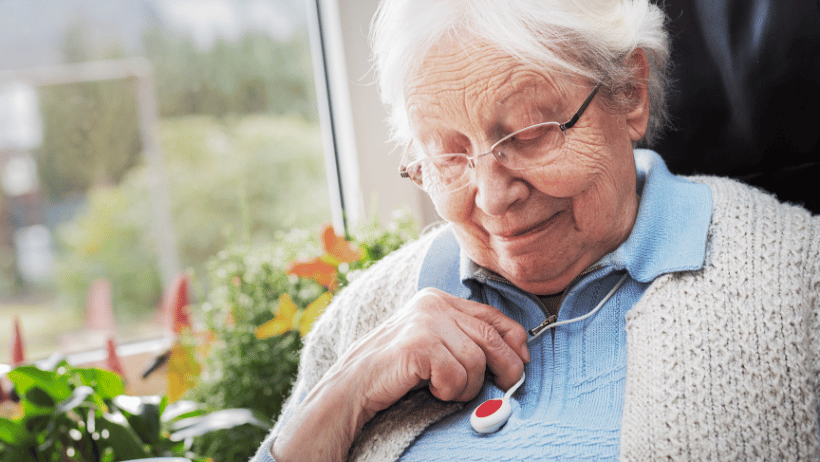Home medical alert systems are a popular choice for seniors and adults with disabilities who want to be their safety in a medical emergency. More than 54% of adults in the U.S. rely on a medical alert device to ensure their safety and wellbeing.
These systems are user-friendly, often set up at home or worn as a bracelet or necklace. They provide immediate access to an emergency monitoring center that is staffed 24/7 by professionals. With a simple press of a button, users can get help quickly, and responder services will be dispatched to their location if necessary.
Let's take a deeper dive into medical alert systems — different types available, benefits, and how to select the right one.
What Is A Home Medical Alert System?
A home medical alert system is technology that provides individuals with an emergency response when needed. It typically consists of a waterproof base station, connected to a cellular or landline connection, and a wearable device. The wearable piece includes one or more help buttons that can be worn on clothing or around the neck. These systems are designed to allow seniors to quickly and easily call for help in any emergency, such as falls, medical emergencies, or household incidents.
These systems can be especially useful for adults who are at a higher risk of a medical emergency. For example, seniors with medical, physical, or cognitive conditions that require extra care and attention.
RELATED CONTENT: 4 Greatest Benefits of Technology for Seniors
Benefits of a Home Medical Alert System
With a medical alert system, help is just the push of a button away. Here are four benefits of having a system in place.
1. Increased Safety and Peace of Mind
A home medical alert system provides peace of mind to families and older adults. Help is only a push of a button away in an emergency. With the help of a medical alarm, seniors can remain independent and safe in their homes without worrying about being alone and vulnerable during a health emergency.
2. 24/7 Monitoring
Many home medical alert systems offer 24-hour monitoring. So, there is always someone available to assist you or your loved one in an emergency, day or night. This system allows everyone to feel more secure since help is only moments away from any location in the home.
3. Quick Response Time
Home medical alert systems are designed to provide quick response time when someone needs it most, such as during a medical crisis or fall. This timely response minimizes injury and provides necessary aid in a timely fashion. By pressing the button on the device, help can be dispatched within seconds so that care can begin as soon as possible.
4. Cost-Effective Alternative
Home medical alert systems are affordable and provide excellent value for money compared to other healthcare services. Furthermore, they are easy to set up and require minimal maintenance over time. Ultimately, a medical alert system is an economical solution for seniors who want to stay safe at home while still having access to professional care if needed.
Types of Home Medical Alert Systems Available
There are different types of medical alert and monitoring systems available to suit your needs.
1. Mobile Alert Systems
Mobile medical alert systems are small, lightweight devices easily worn on the wrist or kept in a pocket. They are typically equipped with GPS tracking and two-way communication capabilities so users can quickly contact emergency services if needed. Mobile medical alerts also often come with fall detection sensors for added safety.
2. Landline-Based Medical Alert Systems
Landline-based medical alert systems are connected to your home phone service. These systems are generally more affordable than mobile systems but require a stable landline connection at home to function properly.
3. Smartphone-Based Medical Alert Systems
Smartphone-based medical alert systems use Bluetooth-enabled technology to connect to an app on your smartphone. These systems allow easy access to emergency services right from your mobile phone. This option is often the most comprehensive and reliable because smartphones do not require any additional hardware or setup processes. Just download the app and sign up for service.
RELATED CONTENT: Top Common Tech Upgrades That Help Keep Seniors Safe
How to Choose the Right System for Your Needs
When choosing the best home medical alert system for yourself or a loved one, it is essential to consider several factors. Here are four of the most important ones.
1. Cost
According to the National Council on Aging, the average monthly fee of medical alert systems ranges between $20–$45. Compare prices before deciding which one is right. Look for systems that include payment plans or special offers to find affordable solutions.
2. Range
The alert system's range should be very important to consider when deciding. Most systems range from 300-1000 feet. However, some may offer coverage up to a mile or more away from the base unit. Make sure that the system you choose meets your needs in terms of coverage distance.
3. Monitoring Service Availability
Many home medical alert systems require an outside monitoring service to call for help in an emergency. Research what type of monitoring services are available with the system and ensure they are reliable and available in your area.
4. Features & Technology
It is vital to consider any additional features or technologies that come with the system you choose. Some medical alert systems come with 24/7 monitoring services, automatic fall detection technology, two-way voice communication capabilities, and more. Consider what features would be beneficial in helping you stay safe at home and choose a system with them included.
FAQs About Home Medical Alert Systems
1. What is the cost of a home medical alert system?
The cost of a home medical alert system can vary widely depending on the features and provider. Prices range from around $20 to over $300 per month. Some examples of monthly plans are Basic Alerts at $34.95/mo and Complete Connect at $49.95/mo, both provided by Medical Guardian.
2. Are there any special requirements for installing a home medical alert system?
Most medical alert systems require minimal setup. You may need to place the central console unit in an accessible location near a power outlet or telephone connection or set up the mobile device with GPS tracking if required.
Special requirements for installing a home medical alert system depend mainly on the type of system you have chosen. For example, some systems are portable, while others require professional installation. Some providers may offer installation services as part of their service plan or for an additional fee.
3. How long do batteries last on a home medical alert system?
The batteries usually last between 3-5 years before needing to be replaced, depending on type and usage frequency. Battery life indicators will inform you when it is time to replace them with fresh ones.
4. Are all components of a home medical alert system waterproof?
Some components of home medical alert systems are waterproof, while others are water resistant only. This should be indicated in the product information when making your purchase decision.
Conclusion
A home medical alert system is a great way to ensure you or your aging family members can get help in an emergency. Choosing the right device and features will help you make an informed decision about what type of medical alert system is right for you and your family. Don’t wait until it's too late. Set up a home medical alert system today!
About the Author
 Sam Molony is the Head of Content and SEO at Community Phone, where he leads a team of digital marketing experts. With a passion for creating high-quality content and driving results through search engine optimization, Sam has helped businesses of all sizes achieve success online.
Sam Molony is the Head of Content and SEO at Community Phone, where he leads a team of digital marketing experts. With a passion for creating high-quality content and driving results through search engine optimization, Sam has helped businesses of all sizes achieve success online.

